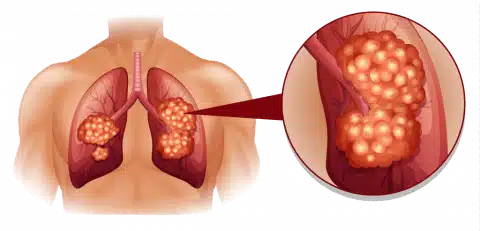Mesothelioma Treatment Options
Mesothelioma is a diffuse tumor and typically does not develop as just one discrete cancerous growth. Instead, it often spreads along nearby surfaces, nerves, and blood vessels, making it hard to treat. Mesothelioma treatments to date have not led to a cure but are done to reduce symptoms and help extend life.
Weitz & Luxenberg does not provide medical advice, and the decision of which treatment options are best in any given situation is a matter between a patient and his or her doctors. When choosing treatment for mesothelioma, doctors will consider three main factors: the location and extent of the tumor, whether it has spread to lymph nodes or other organs, and a patient’s health and personal wishes.
Based on these factors, doctors may recommend using one or more of the four types of standard treatments. These include:
- Surgery.
- Radiation therapy.
- Chemotherapy.
- Targeted therapy.(1) (2)

Mesothelioma cancer often advances quickly after onset and progress in prolonging survival has been slow. With support from Weitz & Luxenberg, researchers at the Vaccine & Immunotherapy Center (VIC) at Massachusetts General Hospital have been able to accelerate their mesothelioma cancer research, testing more treatments at a faster rate.
In addition to immunotherapy treatments, like those being investigated at the VIC, other emerging methods to treat mesothelioma include gene therapy and photodynamic therapy.(3)
Mesothelioma Cancer Care Team
Mesothelioma is a rare, asbestos-related cancer. Doctors diagnose only about 3,000 new cases each year.(4) For this reason, many doctors lack extensive experience in treating the disease and may refer you to specialists who are more familiar with treating mesothelioma patients.
Depending on the stage of your cancer and the treatment options available to you, you may have different types of doctors as part of your treatment team.
- Thoracic surgeons treat diseases of the lungs and chest with surgery.
- Surgical oncologists treat cancer with surgery.
- Radiation oncologists treat cancer with radiation therapy.
- Medical oncologists treat cancer with medicines, such as chemotherapy.
- Pulmonologists specialize in medical treatment of diseases of the lungs.
Other health professionals, including physician assistants, nurse practitioners, nurses, respiratory therapists, and social workers, may be involved in your treatment, too. Seeking a second opinion is recommended when possible. It’s also important to understand the likely benefits and possible risks associated with the different treatment options.(2)
Mesothelioma Surgery
Surgery is not likely to cure you of mesothelioma, but there’s a chance it could help you live longer. Doctors almost always recommend surgery for patients whose mesothelioma has not spread from its original site to other parts of the body. In instances of more advanced mesothelioma, doctors evaluate whether to pursue surgery on a case-by-case basis.(5) In general, patients whose mesothelioma can be operated on are likely to live longer than patients whose cancer has spread too far to be removed.(6)
Diagnosed with mesothelioma after being exposed to asbestos? Explore your legal options.
Get a Free Case ReviewSurgery to treat mesothelioma usually has one of two goals: to remove as much of the cancer as possible or to remove a portion of the cancer to relieve pain and other symptoms caused by the tumor.
Surgery by Mesothelioma Type
Mesothelioma is classified by where it starts in the body. The location of a tumor can play a role in determining what type of surgery options, if any, are available to you. Unfortunately, with all types of mesothelioma, by the time you consider surgery, the tumors often have spread too far for a surgeon to remove them completely.

Surgery for Pleural Mesothelioma
Doctors may recommend one of several surgical procedures to treat pleural mesothelioma, which is cancer on the lining of the lung. However, sometimes it’s not until after they start operating that surgeons are able to tell the full extent of the cancer and which surgery may be the most appropriate.(7)
Extrapleural Pneumonectomy (EPP)
Extrapleural pneumonectomy is an extensive operation in which surgeons may remove an entire lung and its lining, several nearby lymph nodes, part of the diaphragm, and the lining of the sac around the heart, known as the pericardium. Surgeons then may need to reconstruct the diaphragm and the pericardium with man-made materials.
For many patients, this type of surgery may offer the best chance to remove all of the cancer. However, as many as one out of three people who undergo this surgery experience major complications. Doctors may require several tests ahead of the operation to ensure you:
- Are healthy enough for the procedure.
- Have good lung function.
- Don’t have any other serious illnesses.(7)
Pleurectomy/Decortication (P/D)
Pleurectomy/decortication is a less extensive operation that can help control the buildup of fluid, improve breathing, and reduce pain caused by pleural mesothelioma.
During pleurectomy/decortication, surgeons remove part of a lung and its lining, as well as the entire visible tumor. Unlike with extrapleural pneumonectomy, surgeons typically do not remove the lung and diaphragm when performing pleurectomy/decortication.(7)
Other Pleural Mesothelioma Surgeries
Other surgical procedures used to treat pleural mesothelioma include:
Debulking (partial pleurectomy) — Surgery that aims to remove as much of the mesothelioma as possible but generally removes less tissue than in a pleurectomy/decortication.(7)
Pleurodesis — Surgery to drain fluid that has accumulated around the lungs and to stop the buildup of fluid by irritating the pleura.
Wide local excision — Surgery to remove the cancer and some of the healthy tissue around it.
Typically, pleural mesothelioma surgeries have better results when followed by treatment options intended to kill any cancer cells that may be left. This treatment is called adjuvant therapy and may include radiation therapy, chemotherapy, and immunotherapy.(1) (8)
Possible Side Effects of Surgery
Like with other surgeries, operations to treat mesothelioma carry risks. The extent of these potential complications depends on the type of surgery and the person’s health before the procedure. Serious risks and side effects are typically less common with less extensive operations.
Serious complications of extrapleural pneumonectomy, for example, can include:
- Bleeding.
- Blood clots.
- Wound infections.
- Changes in heart rhythm.
- Pneumonia.
- Fluid buildup in the chest.
- Loss of lung function.
To perform pleural mesothelioma surgery, surgeons must often spread patients’ ribs. As a result, patients may experience lingering pain at the incision site, and they may not be able to participate in all their normal activities for at least four to eight weeks.(7)

Surgery for Peritoneal Mesothelioma
Peritoneal mesothelioma develops in the lining of the abdomen. Patients with this type of mesothelioma undergo surgery either to help ease symptoms or to remove a tumor from the wall of the abdomen and digestive organs.(7)
Debulking
Debulking is a type of surgery in which surgeons try to remove as much of the mesothelioma as possible — even when that means also removing pieces of the intestine.
When treating peritoneal mesothelioma, doctors may combine debulking surgery with intraoperative chemotherapy. This is when chemotherapy is given into the abdomen after the cancer is debulked (removed) but before the operation is completed. Doctors leave the drugs in for a short time, remove them, and then close the incision.
In some cases, the chemotherapy drugs are heated. This is called heated intraoperative (or intraperitoneal) chemotherapy or HIPEC. After a surgeon removes all the visible cancer, he or she heats and pumps a mixture of anticancer drugs into and out of the abdomen to kill remaining cancer cells. Heating the anticancer drugs may kill more cancer cells, so debulking surgery combined with HIPEC can result in better outcomes.(1) (7) (8)
Omentectomy
Cancers that form on the lining of the abdominal cavity often spread to the omentum, a layer of tissue that supports and protects the intestines and organs in the abdomen. As part of surgery for peritoneal mesothelioma, surgeons may remove the omentum.(7)

Surgery for Pericardial Mesothelioma
Treatment options for pericardial mesothelioma are few because this type of cancer develops on the lining of an extremely delicate organ: the heart. In some cases, surgery can help remove tumors from the sac around the heart.
Surgery for Testicular Mesothelioma
Testicular mesothelioma develops on the lining that covers the testicles, known as the tunica vaginalis. Surgeons typically can’t remove this type of mesothelioma completely. Most of the time, doctors only perform this surgery because they mistake the tumor for a hernia, only to realize after beginning surgery that it’s, in fact, a tumor.(7)
Mesothelioma Chemotherapy
Chemotherapy is a cancer treatment that uses powerful drugs to stop cancer cells from growing, either by killing the cells or by stopping them from dividing. Doctors often combine chemotherapy with other treatments, such as surgery and radiation therapy, but the drug can also act as the primary form of treatment for patients who either opt out of surgery or are not good candidates for it.
When surgery is an option, mesothelioma patients may receive chemotherapy before the procedure to try to shrink the cancer and reduce the chances it will spread. This is called neoadjuvant therapy. Patients may also receive chemotherapy after surgery (adjuvant therapy) to try to kill any cancer cells the surgeon may have missed. Chemotherapy may shrink the cancer or slow its growth, but it is not likely to cure it.(1) (9) (10)

Using Chemotherapy to Treat Mesothelioma
The way medical professionals choose to administer the chemotherapy depends on the type and stage of the cancer they’re treating. Most patients receive chemotherapy drugs as a pill or in their veins as an intravenous infusion. Some doctors inject the medications directly into the part of the body where the cancer has formed.
Medical oncologists consider several factors when determining which chemotherapy medications to use and how to give them. These factors include:
- Type, stage, and extent of cancer.
- Age and overall health.
- Responses to previous mesothelioma chemotherapy drugs.
- Other types of treatment a patient may undergo in the future.(1) (9)
Were you or a loved one diagnosed with mesothelioma? Call for a free legal consultation.
(833) 977-3437How Mesothelioma Patients Receive Chemotherapy
Doctors usually give chemotherapy in three- to four-week cycles, following each period of treatment with a rest period to allow the body time to recover. Doctors usually administer the treatment in two main ways: systemic chemotherapy and regional chemotherapy.
Systemic chemotherapy — Patients receive chemotherapy via pill or intravenous injection into the vein or muscle. The drugs enter the bloodstream and travel throughout the body to destroy cancer cells.
Regional chemotherapy — Doctors use a small tube to inject chemotherapy drugs directly into the area of the body where the mesothelioma developed. Sometimes the drugs are heated before they’re injected.(1) (10)
Types of Mesothelioma Chemotherapy Drugs
Doctors choose from several chemotherapy drugs to treat mesothelioma, including:
- Pemetrexed (Alimta®).
- Cisplatin.
- Carboplatin.
- Gemcitabine (Gemzar®).
- Methotrexate.
- Vinorelbine.
- Mitomycin.
- Doxorubicin (Adriamycin®).
Your mesothelioma care team may use a combination of two or more anticancer drugs. This is called combination chemotherapy. Some patients, however, may not be able to tolerate more than one drug.(1) (9) (10)
Possible Side Effects
Chemotherapy drugs may inadvertently attack healthy cells, leading to side effects. The side effects depend on the type, amount, and duration of drug use. Common side effects may include:
- Hair loss.
- Mouth sores.
- Loss of appetite.
- Nausea and vomiting.
- Diarrhea.
- Increased chance of infections (from having too few white blood cells).
- Easy bruising or bleeding (from having too few blood platelets).
- Fatigue (from having too few red blood cells).
Once a patient stops chemotherapy treatment, these side effects typically go away. Some patients who undergo chemotherapy may turn to medications or other methods to lessen the side effects.
Certain chemotherapy drugs can have other side effects, including nerve damage called neuropathy. This can sometimes lead to hearing loss or symptoms in the hands and feet, including pain, burning or tingling sensations, sensitivity to cold or heat, or weakness. Neuropathy and the resulting side effects may linger in some people but usually disappear once a patient stops treatment.(10)
Diagnosed with mesothelioma after being exposed to asbestos? Explore your legal options.
Get a Free Case ReviewMesothelioma Radiation Therapy
For patients diagnosed with mesothelioma, doctors may recommend radiation as part of their treatment. Radiation from high-energy X-rays or other types of exposure can permanently damage the DNA of cancerous cells. This prevents the cells from spreading and can ultimately kill them. When cancer cells die, tumors shrink. As a result, symptoms tend to lessen.
However, mesothelioma tumors are often challenging to treat with radiation therapy because they don’t form as one clear mass. This makes it hard to avoid nearby normal tissues when aiming radiation at the cancer.(1) (11) (12)
Using Radiation Therapy to Treat Mesothelioma
Doctors decide how to use radiation therapy based on the type and stage of the cancer. The goal of radiation therapy is different depending on the patient. Uses of radiation therapy can include:
- Treatment after surgery to kill small areas of cancer that surgeons may have missed.
- A palliative procedure to relieve symptoms of mesothelioma, including shortness of breath, pain, bleeding, or trouble swallowing, and to improve patients’ quality of life.(1) (12)
How Mesothelioma Patients Receive Radiation
Like with chemotherapy and surgery, doctors may use radiation on its own or in combination with other methods to treat mesothelioma. Radiation may be delivered in two ways: external beam radiation therapy or brachytherapy (internal radiotherapy).
External Beam Radiation Therapy (EBRT)
External beam radiation therapy is the most common form of radiation therapy for mesothelioma. It uses a machine outside the body to send radiation to kill the cancer cells. It’s similar to getting an X-ray, but the radiation is much stronger. Although it can take your care team some time to get you into place for radiation therapy, each actual treatment lasts only a few minutes. Typically, mesothelioma patients who receive radiation undergo the treatments five days a week for several weeks.
Brachytherapy (or Internal Radiotherapy)
Doctors seldom use brachytherapy for mesothelioma cancer treatment. For this type of therapy, doctors place a radioactive substance sealed in needles, seeds, wires, or catheters directly into or near the cancer. The radiation doesn’t travel far, limiting the possible damage to nearby healthy tissues.(1) (12)
Possible Side Effects
Side effects of radiation differ depending on the type of therapy. For external radiation, side effects can include:
- Fatigue.
- Sunburn-like skin problems.
- Hair loss where the radiation enters the body.
These usually go away once treatment stops.
Over time, radiation therapy in the chest can damage the lungs and lead to trouble breathing and shortness of breath. Radiation therapy in the abdomen may cause nausea, vomiting, diarrhea, and loss of appetite.
The side effects are usually worse when doctors combine radiation therapy with chemotherapy.(12)
Targeted Therapy
Researchers have developed newer therapies intended to attack specific cancer cells. These drugs and substances are called targeted therapies.
Targeted therapies technically are considered chemotherapy, but they work differently from standard chemotherapy drugs, which have limited effect against mesothelioma. Targeted drugs attack specific parts of cancer cells that make the cancer cells unlike other cells. The drugs may also target cells that help cancer cells grow.
Targeted therapies often have other, less severe side effects. This type of treatment typically causes less harm to healthy cells than chemotherapy or radiation therapy.
In general, when used as cancer treatment, targeted drugs work to:
- Shut down or block chemical signals that tell the cancer cell to grow and divide.
- Kill the cells by changing proteins within the cancer cells.
- Stop new blood vessels that feed the cancer cells from forming.
- Trigger your immune system to kill the cancer cells.
- Carry a toxin to the cancer cell to kill it while leaving normal cells alone.(13) (14)
Monoclonal Antibody Therapy
A type of target therapy, monoclonal antibody therapy uses antibodies made in the laboratory that can identify substances in the body that help cancer cells grow. These antibodies attach to the substances, killing the cancer cells, blocking their growth, or keeping them from spreading. Monoclonal antibodies are given by infusion and can carry drugs, toxins, or radioactive material directly to cancer cells.(14)
Kinase Inhibitors
Also a type of targeted therapy, kinase inhibitors block signals needed for tumors to grow. These types of therapies are currently being studied in the treatment of malignant mesothelioma.(1)
Were you or a loved one diagnosed with mesothelioma? Call for a free legal consultation.
(833) 977-3437Clinical Trials
For some mesothelioma patients, participating in a clinical trial may be the best treatment option. It’s one way to get state-of-the-art cancer treatment and may be the only way to receive the newest cancer therapies.
As part of the cancer-research process, clinical trials are meant to improve current treatments or to discover whether new cancer treatments are safe and effective or better than standard treatments.
Researchers have conducted only a few large clinical trials of treatments for mesothelioma. Some clinical trials only include patients who have not yet received treatment.
Clinical trials may test:
- Treatments for patients whose cancer has not gotten better from other treatments.
- New ways to stop cancer from coming back.
- Different methods for reducing the side effects of cancer treatment.(2)
Emerging Treatments
With no known cure for mesothelioma, scientists continue to look for better ways to prevent, treat, and even cure the deadly disease.
Through research, newer treatments are emerging and may give doctors and their patients more options.
These include:
Immunotherapy — A treatment that rallies the patient’s immune system to fight mesothelioma cancer.
Photodynamic Therapy — A therapy that uses a light-activated drug to collect and kill cancer cells.
Gene Therapy — A treatment that attempts to add new genes to cancer cells to make them easier to kill.
Virus Therapy — A therapy that involves putting a virus into the body to either infect and kill the cancer cells directly or cause the immune system to attack the cells.(1) (13)
Alternative Therapies & Complementary Methods
Though your doctor may not mention them, you may hear about alternative or complementary methods to relieve symptoms. These methods can include:
- Vitamins.
- Herbs.
- Special diets.
- Acupuncture.
- Massage.

Alternative therapies are treatments patients use instead of a doctor’s medical treatment, while complementary methods are methods patients use along with their regular medical care. These methods might help relieve symptoms and help patients feel better, but many have not been proven to work, and some may be dangerous. You should consult your cancer care team about any method you are considering.(2)
Palliative Procedures
When doctors recommend surgery, radiation therapy, or chemotherapy as a way to relieve or treat mesothelioma symptoms, keep cancer in check, or improve quality of life, it’s called palliative treatment.
Fluid buildup in the body, for example, is one mesothelioma symptom that may call for palliative care. Fluid buildup can cause trouble breathing or other problems. Doctors may use palliative procedures to remove the fluid or help keep it from coming back. These procedures include:
- Removal of fluid.
- Pleurodesis.
- Shunt placement.
- Catheter placement.(15)
How We Can Help
Mesothelioma treatment can be immensely expensive. It can also cause a great deal of pain and suffering, only to end in death. The experienced mesothelioma attorneys at Weitz & Luxenberg have almost 40 years of experience helping mesothelioma victims get the compensation they need and the justice they deserve.*
If you have been diagnosed with mesothelioma or your loved one is living with or has died from the disease, we would be honored to assist you. For a free consultation, call (833) 977-3437 or fill out a form to speak with one of our compassionate and skilled attorneys.
